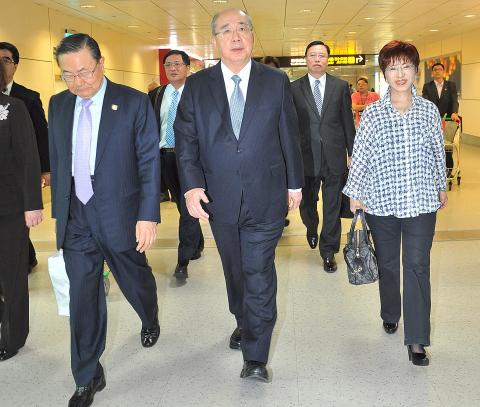|
Wu returns from
Beijing, dismisses DPP’s criticism
HIS OWN WORDS: Premier Jiang Yi-huah told the
legislature yesterday that the messages conveyed by Wu to Xi ‘did not represent
the government’s position’
By Mo Yan-chih and Shih Hsiu-chuan / Staff reporters

Former Chinese Nationalist Party
(KMT) chairman Wu Poh-hsiung, center, KMT Deputy Chairperson Hung Hsiu-chu,
right, and former KMT vice chairman Chan Chun-po, left, arrive at Taiwan Taoyuan
International Airport yesterday afternoon.
Photo: Yao Kai-shiou, Taipei Times
President Ma Ying-jeou’s (馬英九) affirmation
that relations between Taiwan and China are not state-to-state did not belittle
the nation’s sovereignty, former Chinese Nationalist Party (KMT) chairman Wu
Poh-hsiung (吳伯雄) said yesterday upon returning from Beijing, insisting that the
definition of Taiwan-China relations is in the Constitution.
Wu also dismissed concerns about China’s mounting pressure for Taiwan to start
political negotiations.
He said Chinese President Xi Jinping (習近平) has a deep understanding of Taiwan’s
situation and agreed that the two sides of the Taiwan Strait must exchange
goodwill gestures and develop cross-strait relations step by step.
“Chairman Ma Ying-jeou is the president of the ROC [Republic of China], and of
course he abides by the ROC Constitution … Only those who do not identify with
the ROC would accuse him of trying to sell out the country,” Wu said.
Wu dismissed the Democratic Progressive Party’s (DPP) criticism of his meeting
with Xi on Thursday. The DPP accused the Ma administration of damaging the
nation’s sovereignty by using the KMT-Chinese Communist Party (CCP)
communication mechanism.
The opposition party also criticized Ma for reiterating earlier this week that
relations between Taiwan and China are not state-to-state. The DPP expressed
concerns about the Ma administration’s agreement with China to set up
representative offices on each side of the Taiwan Strait.
The establishment of the offices, the DPP said, could speed up bilateral
political negotiations, which could include exchange visits of high-ranking
officials and the removal of the missiles aimed at Taiwan.
Separately yesterday, Mainland Affairs Council Minister Wang Yu-chi (王郁琦) echoed
Wu’s comments and said the government’s stance that “one China” refers to the
ROC remains unchanged.
“The government’s stance on cross-strait ties is based on the 1992 consensus and
our stance that ‘one China’ means the ROC is unequivocal and has never changed,”
he said at a meeting in Kaohsiung with China-based Taiwanese businesspeople.
At the legislature in Taipei, while fielding a question from Taiwan Solidarity
Union Legislator Hsu Chung-hsin (許忠信), Premier Jiang Yi-huah (江宜樺) said that the
messages conveyed by Wu to Xi “did not represent the government’s position.”
Jiang said that was because the Wu-Xi meeting was conducted under the KMT-CCP
communication platform, adding that he paid close attention to what had been
discussed at the meeting and he did not think that Wu represented the government
in his talks with Xi.
Talks with China on any issue should be conducted by the government, Jiang said.
Wu said during his meeting with Xi that both Taiwan and China advocate the “one
China” principle based on their respective laws and systems, and both use a “one
China” framework to define cross-strait relations.
Asked to express his views on Wu’s “one China” framework statement, Jiang said:
“We believe that the ‘one China’ [Wu] referred to is the Republic of China.”
As long as “one China” means the ROC, he agreed to the description that
cross-strait relations are under a “one China” framework, Jiang said.
“The Constitution is also based on the ‘one China’ framework, under which there
is the Taiwan area and the mainland area,” Jiang added.
Jiang tried to defuse Hsu’s concern that Wu referred to “one China” as the
People’s Republic of China, saying he did not believe that Wu interpreted “one
China” that way.
Hsu disagreed, saying: “How could it be possible that [Wu] intended to say that
‘one China’ means the ROC. He was making the statement in China.”
|
![]()
![]()
![]()